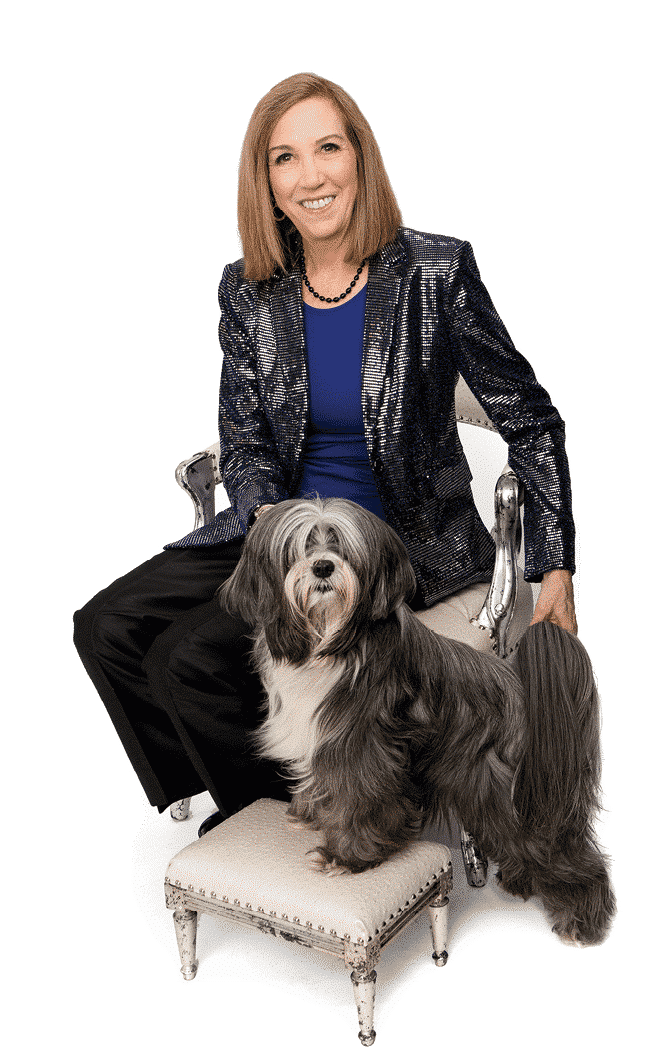Are You Distinguishable from Pro Handlers ? | Language Reframe: “The Handler Presented Professionally !”
We sometimes hear the critique of, “The owner handler didn’t look like a pro.” Here’s a call to action: Let’s reframe the language. Reframe: “The owner handler didn’t present professionally.”
Or even better, rather than, “the owner handler presents like a pro handler,” let’s give them the respect and credit deserved.
Reframe: “The handler presents professionally!”
Does It Matter?
I recently sat with an owner handler whose goal was just that. She believed that judges could not tell if she was a pro or an owner. She also imagined that it mattered.
The questions for you are:
1. Is this a goal that is worthy of your time and energy?
2. Is this a goal that will propel your dog into the
winner’s circle?F
And consider this,
3. Does it, in fact, matter to the judge?
The answer to question one is yes and no. The answer to question two is yes and no. The answer to question three is, you guessed it, yes and no!
If your goal as an owner handler is to be indistinguishable from a professional handler, it is not worthy of your time and energy because it is an external desire that doesn’t include your dog or your connection with your dog. It makes the competition about people and not about the dogs. However, as you develop your talent, skills, and timing, and your understanding of the sport, you will enhance your own ability to show your dog to his best advantage, which is why it IS worth your time and energy. Remember, the core goal is not for you to be better than someone else. The objective is to be better for the benefit of the dog—to enhance his virtues in the eyes of the judge.
Get Over Yourself
This goal will not propel you into the winner’s circle in and of itself. By raising the bar of your own presentation to a level that matches that of the top-quality handlers, your dog will not necessarily win more. There are still several variables that come into play to make that happen. First of all, you have to get over yourself. Yes, I really said that. Get over yourself. It’s about the dog! Get that dog in peak condition, in muscle and coat, and pull it all together with the mental game of dogs.
Here’s the truth about this question. When your skills, talent, and timing improve to the level that can match a professional, then it will come down to who has the better dog. Can your dog stand up to his competition?
From a judge’s perspective, some owner handlers have not developed the skill or risen to the level that enables them to hide or obscure their dog’s faults. A skillset that is even more valuable than showing off the virtues is being able to diminish or conceal the faults. A flawed front assembly or a bad topline must be concealed in a timely and proficient way. Therefore, being a quality handler will only take you so far.
Getting the most from a dog that has the “it factor,” or one that is average or better, however, is doable. Pairing quality handler skills and the application of a Dog Show Mentor mindset is the dream combination. All seasoned dog people know that the “it factor” can cover a multitude of sins in a dog.
So, the answer is that being a quality handler will only propel you to the winner’s circle if you have a good dog or a good dog with a good mindset. Finally, and most importantly as an owner handler, does it really matter if you are indistinguishable to the judge? Do judges care?
Of course, judges care. Ultimately, they want to see all the virtues of a dog. If they can’t see them as a result of poor handling, they are unhappy with the dogs in the ring. Stop worrying about whether the judge is somehow punishing you for being an owner handler, and have faith in yourself. Be confident that the work you’ve been putting in will pay off.
FACT: Owner Handlers are not losing to pros because the pros are better. It is the pros who are showing up like rock stars. But an owner handler can—and many have—shown up like rock stars to win as well.
So, who wins? The handler who puts in the time and dedication? The cream of the crop? The ones who show up with a professional attitude and presence whether they are professional or owner handler? Exactly. Here’s how that looks.
Wait a Minute, Wait a Minute
As a judge, I should be looking at the dog, right? But sometimes it’s the handler who takes my attention away from the dog, sometimes intentionally, sometimes not. If the handler shouldn’t even be in my thought process, how do they make an impact?
Here’s how that plays out. One handler in particular always comments on my shoes. I came to realize that it is a way that attention, at that particular moment, is diverted from whatever part of the dog the handler doesn’t want me to focus on. It’s a clever, intentional maneuver by a “pro.”
Another handler waves their arms broadly and quickly, diverting my attention from the BEST part of the dog being examined. It’s an unintended distraction by an unskilled handler.
If I have two dogs of equal quality in the ring with those same two handlers, then I am shown what has been skillfully veiled or ineptly concealed, either intentionally or not.
Getting back to our original argument: As an owner handler, is it possible to be indistinguishable from the pro handlers? Let’s look at some differences between Max Handler and Felix Handler, two “quality handlers.”
Two Quality Handlers
Max has a system in place for training, conditioning, and showing dogs. Max took an early government retirement. He spends his days with the dogs he’s showing and maintains meticulous records on each dog. They all get daily exercise, food, and vitamins according to need. At night, the dogs come into the house and play with the family. Sometimes he takes individual dogs from ringside when he knows they are steady in the ring for the judge.
Max meets his dog show coach ringside to talk about and reflect on his approach to showing the dogs. When he meets his coach, there is a switch that turns on. His competitive spirit ignites, which spurs him on when the competition gets tough.
In addition to working as an insurance adjuster during the week, Felix also has a system. Felix has flexibility so that he can be at longer show clusters.
Felix has a system to work with the dogs on a daily basis to focus on conditioning, grooming, and training. He keeps records on each dog, adjusts his approach as needed, and is committed to maintaining the quality of dog that he is proud to show in the ring.
Both Max and Felix are owner handlers. Let’s take a closer look to compare these handlers. Remember, in the end it doesn’t matter. It’s about whoever shows up 100 percent.
Two Handlers: A Nuanced Look
Max is a quality owner handler with ten years of experience with eight different breeds. He enjoys the dog show community and has made numerous friendships with people he has met and worked with over his span of time in dogs.
He has competed on the local and national stage, and he attends, plus-or-minus, a hundred shows a year. He makes about $100k annually. Max has one-to-two litters a year of a breed that is easy to breed and has puppies that are desirable to the general public. After household expenses, health insurance, and savings, he devotes 90 percent of his income to his dogs. He has a budget of $35,000 to dedicate to his competition materials. This includes clothes, gear, education, and training for both himself and his dog. He spends an average of $683 every show weekend, which includes the costs for a hotel, meals, entry fees, show garb, and show equipment.
As a former athlete, Max understands the value of coaching. He takes one weekend a year off from shows to devote to an on-site handling clinic, which costs $1,000. Every few years he spends ten times that on an intensive coaching program that helps him stay sharp. He adjusts and maintains his own show strategy blueprint.
Max has the time and actively dedicates it to pursue further education and training for his dogs’ show presentation. Whether it is or not, he approaches showing dogs as if it were his profession.
Felix is an owner handler with ten years of experience. He shows because he likes to travel. Felix works with one breed and has competed on the local and national stage. He attends thirty shows per year and dedicates 50 percent of his salary to his dogs. He attends handling classes once a month and goes to one weekend handling seminar a year. Felix leaves the show once his breed is finished and doesn’t have a lot of contact with others at the shows. His friends have about the same knowledge level as he has, and they usually show dogs to their championship and rarely special them.
These are two owner handlers, but I could rewrite the comparison and present Max as a professional—and you would nod your head. He’s an owner handler who shows up professionally. So, let’s pay particular attention to our language.
A Call to Action: Language Reframe
Don’t say the owner handler didn’t look like a pro. Rather, the owner handler didn’t present professionally.
Those who are ready to rise to the top are an elite group. The handlers who occupy a space in the winner’s circle have put in the work. They do the following:
● They are willing to put in the time, resources, and dedication.
● They understand the rules and continue to evolve their tools to win.
● They have a deep understanding of the breed standards and how to strategically prepare for the ring.
● They will debrief and learn from each experience in preparation for their next show.
● They support their dogs to shine in the ring and even after the shows are over.
● They are fully committed to showing dogs and present themselves with a superstar quality.
My question to you is: Have you put in the work? Do you need help putting together an action plan? Do you know where to go? Are you prepared to rise to the top? Are you ready to join the elite group of handlers—whether professionals or owner handlers—who step up, support their dogs, and shine in the winner’s circle?









